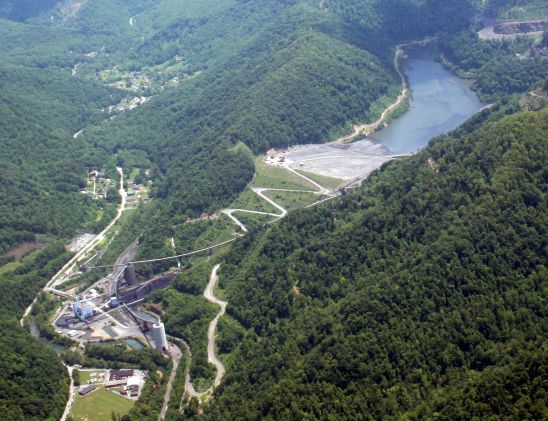In Raleigh County, West Virginia, about 45 miles from Charleston, just over 200 students attend Marsh Fork Elementary School. Though small, Marsh Fork is important to the folks in the Coal River Valley, and not just because it’s the only school in the county with high enough enrollment to remain open. No, the fate of Marsh Fork matters more because it represents all the special interests and politics that have come to define life in the shadows of Big Coal.
Not 300 feet away from where children learn and play nine months a year sits a leaking, 385-feet tall coal refuse dam with a nearly 3-billion gallon capacity. Never mind the coal dust that has been found in the school. Never mind the drinking-water contamination that has been reported. If this dam breaks, it will destroy everyone and everything within 30 miles. So why are 200-plus children still making the trip to school every day despite the constant threat of illness and even death?
Because they have nowhere else to go.

Photo by Vivian Stockman. That’s the school in the lower left.
Enter Ed Wiley. Two years ago, Ed and his wife Debbie Jarrell began to notice their granddaughter coming home sick from school with greater frequency. And when Ed would arrive to pick her up, he noticed it wasn’t just Kayla. Dozens of children were signed out sick.
Ed decided to take action. The twofold threat of the sludge dam and migrating coal dust was too much for him to ignore.
Working with local activists like Coal River Mountain Watch, Ohio Valley Environmental Coalition, and Appalachian Voices — along with other concerned parents and citizens — Ed petitioned his local school board for help. Problem was, when the WV Department of Environmental Protection came in to test for coal dust, it didn’t find any. Not surprisingly — you see, Massey Energy (they own the offending sludge dam and Goals Coal Processing Plant that creates the dust) pours a lot of money into elections, and into West Virginia itself, to make sure its public image is as clean and friendly as possible.
Without a DEP coal dust finding, the school board said its hands were tied. So Ed went to Governor Joe Manchin, who responded with a test of the school’s ventilation system. Not helpful.
Finally, an independent study was conducted by D. Scott Simonton, PE, PhD, and whaddya know, it found that yes, “fugitive coal dust emissions” were present and ready for inhaling by students, teachers, and staff at Marsh Fork Elementary. Surely this would result in some action, Ed thought.
Nope. Nothing. So Ed decided to take matters into his own hands. If neither the school board nor the governor (who, incidentally, considers himself a champion of the state’s schools) would give them the money, they’d start raising funds themselves and petition the federal government for the rest.
If you’ve ever met the people who get things done in West Virginia — local activists like Bo Webb, Judy Bonds, and Maria Gunnoe, people who love where they come from and wouldn’t dream of going anywhere else — you’d know they’re nothing if not hardworking. Ed Wiley is no different. A true multitasker, he decided to combine his fundraising efforts with a trip to D.C., and on August 2, 2006, Ed started the 455-mile journey … on foot.
He walked for 50 days, through two states, all the way to Senator Robert C. Byrd’s office, where he stayed for hours. When he left, the venerable senator from West Virginia had tears in his eyes and promised to explore every avenue to get the students at Marsh Fork Elementary a new school once Congress goes back in session in January. It’s just difficult, Byrd said, because it’s not a federal issue.
Well, now it is. Toward the end of Ed’s walk, asbestos was found in Marsh Fork Elementary, and asbestos equals federal money. If West Virginia’s leaders are smart, they’ll latch onto that asbestos with every ounce of political might they have. Building a new school due to asbestos is a lot easier to explain than building a new school due to coal dust contamination and 3 billion tons of sludge.
While they wait for a decision, though, it’s business as usual for the folks at Marsh Fork Elementary.
Fortunately, Massey was denied the permit to build yet another silo earlier this fall. Let’s hope, for the sake of the kids, it stays that way.


